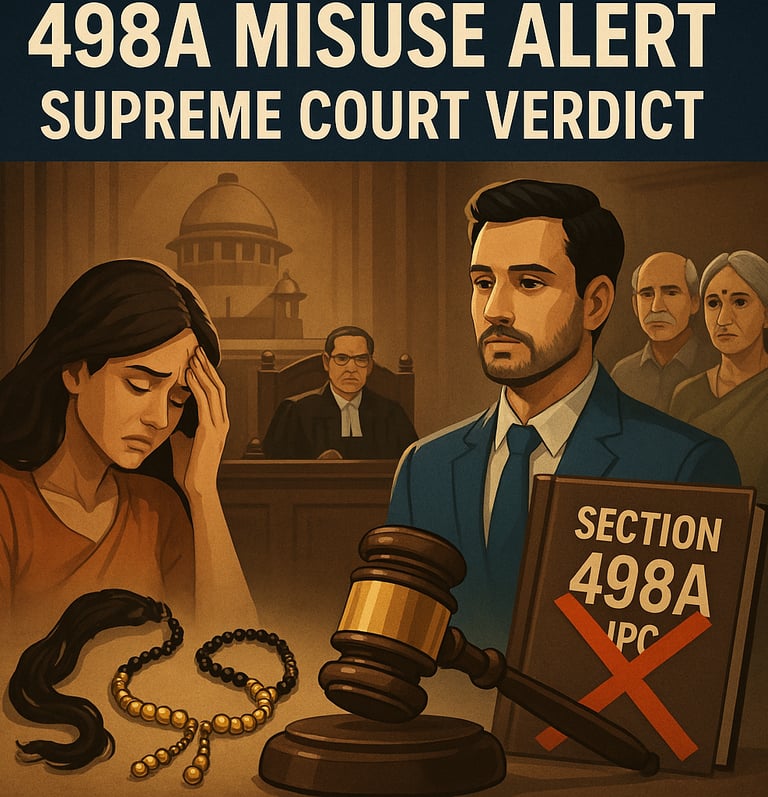Quashed 498A Case Against Husband and In-Laws, Issues Strong Warning on its Misuse-Supreme Court.
The Supreme Court of India has quashed a long-pending FIR under Section 498A IPC filed against a husband and his in-laws, citing misuse of criminal law in matrimonial disputes. The Court stressed that vague and baseless allegations cannot be grounds for prosecution. This landmark 498A judgment reinforces the need to prevent harassment of innocent family members through false dowry and cruelty cases.
Adv. Sachin Gupta | Partner | Altius Astra Attorneys
6/16/20252 min read


Supreme Court Reinforces Guardrails on Section 498A in Ghanshyam Soni Case
June 4, 2025 – In a significant judgment, the Supreme Court of India has quashed a 23-year-old FIR and charge sheet under Section 498A (dowry and domestic cruelty) related to the Ghanshyam Soni case. The Apex Court highlighted both the misuse of 498A and the need for precision and evidence in such allegations.
Background of the Case
A Delhi Police Sub‑Inspector, married to Mr. Soni since 1998, alleged dowry demands of ₹1.5 lakh, a car, and a separate house, along with mental and physical cruelty—including threats involving a dagger during her pregnancy.
An FIR was lodged in December 2002 (FIR No. 1098/2002), followed by charges under Sections 498A, 406, and 34 IPC. The case was dismissed by the trial court in October 2008 on time-bar grounds. However, April 2024 saw the Delhi High Court revive the matter.
Supreme Court’s Key Observations
Vague & Unspecific Allegations: The Court criticized the lack of dates, instances, or firm proof—especially against extended family including the mother-in-law and sisters-in-law.
No Substantive Evidence: There were no medical records, witness statements, or credible injury documentation; previous complaints had been retracted.
Protecting Extended Family Rights: Relying on precedent (K. Subba Rao v. Telangana, 2018), the Bench stressed that distant relatives cannot be indiscriminately drawn into criminal charges without specific involvement.
Demand for Responsible Use of Section 498A: While acknowledging that genuine cruelty cases deserve swift justice, the Court underscored that Section 498A must not be weaponized for personal vendetta.
Final Verdict & Legal Impact
Invoking Article 142, the Supreme Court struck down the FIR and chargesheet, deeming further proceedings oppressive and unjust due to the lack of specificity and proof .
Why This Judgment Matters
Sharper Legal Standards: Section 498A complaints now require specific dates, factual incidents, and evidence not broad or emotional allegations.
Safeguarding Innocents: Courts must act early to prevent frivolous or vindictive litigation that drags in-laws or distant relatives.
Judicial Clarity on 498A Misuse: The ruling aligns with recent observations that misuse is widespread—Delhi courts quashed nearly 47% of cases from 2021–2025 due to lack of merit.
Call for Comprehensive Reform: Advocates propose making Section 498A compoundable, improving virtual trial tools, and incorporating penalties for false accusers to discourage abuse.
This landmark judgment reinforces that justice demands precision—anti-cruelty laws must protect genuine victims but not become tools for persecution.
Altius Astra Attorneys
A premier law firm based in Delhi, India, offering legal representation across various practice areas for citizens rights and interests.
© 2025. Altius Astra Attorneys. All rights reserved.
Contact Us
📞 9899290789, 9818786756
📧 contact@altiusastra.com
3C-ED Block, Madhuban Chowk, Pitampura, Delhi-110034
DISCLAIMER
